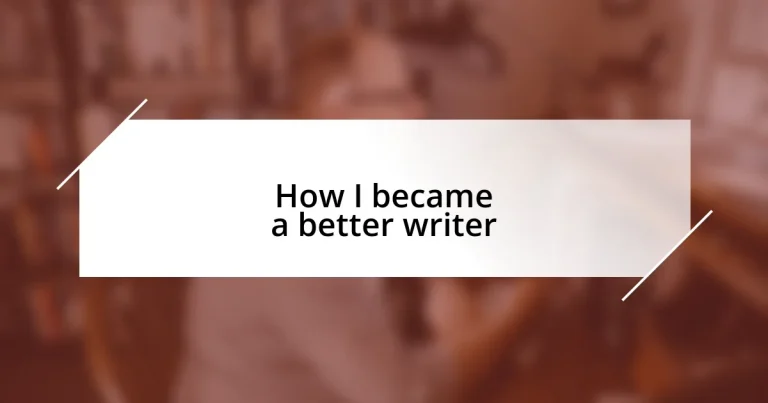Key takeaways:
- Developed writing goals focused on authenticity and emotional connection with readers.
- Established a consistent writing routine, enhancing discipline and creativity.
- Learned to embrace feedback and criticism as essential tools for growth and clarity in writing.
- Engaged with diverse writing styles and communities, enriching voice and narrative through varied perspectives.
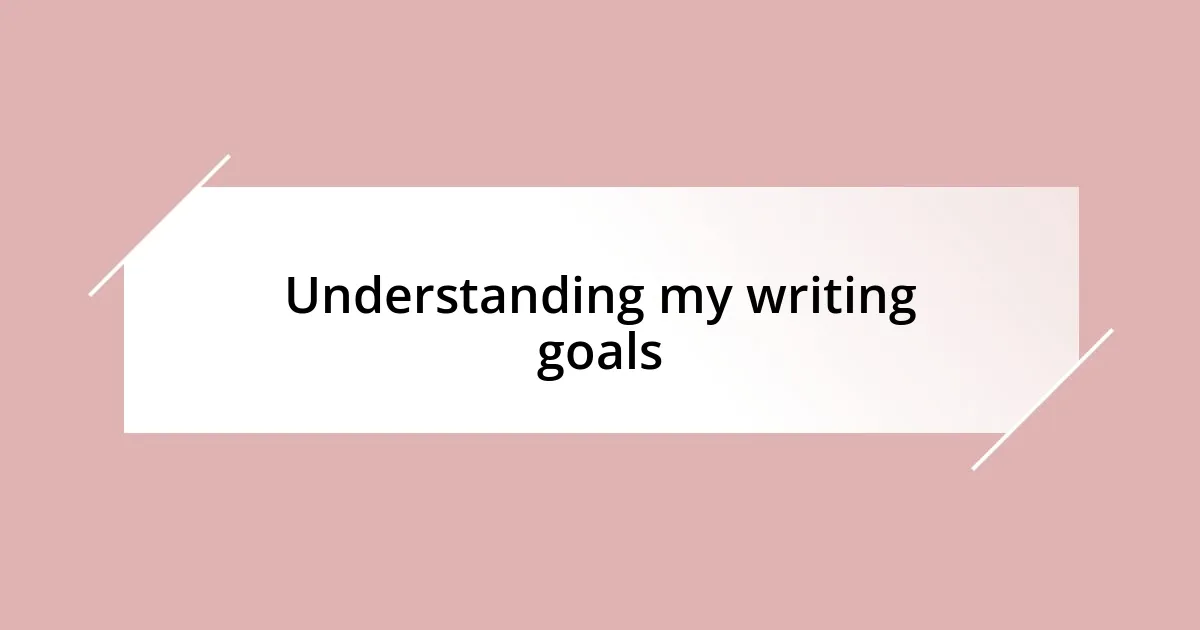
Understanding my writing goals
Understanding my writing goals has been a journey of self-discovery. Early on, I found myself stumbling through various styles and topics without a clear vision. I remember a time when I received feedback on a piece I wrote about personal experiences, and it hit me—what I truly wanted was to connect with readers on a deeper level. Isn’t that what we all yearn for in our writing?
As I began setting specific goals, I prioritized authenticity and vulnerability in my work. I aimed to share not just facts, but feelings, revealing the raw emotions behind my words. One example is when I wrote about loss; putting my heart on the page allowed me to connect with others who had similar experiences. I realized that writing wasn’t just about telling a story, but about evoking emotions and sparking conversations.
In setting goals like improving my narrative style or experimenting with different genres, I embraced challenges that pushed me out of my comfort zone. Each new piece became a canvas for exploration. Can you remember a time when you took a risk in your writing? I know that feeling well—it’s exhilarating and terrifying at once, but so crucial for growth.
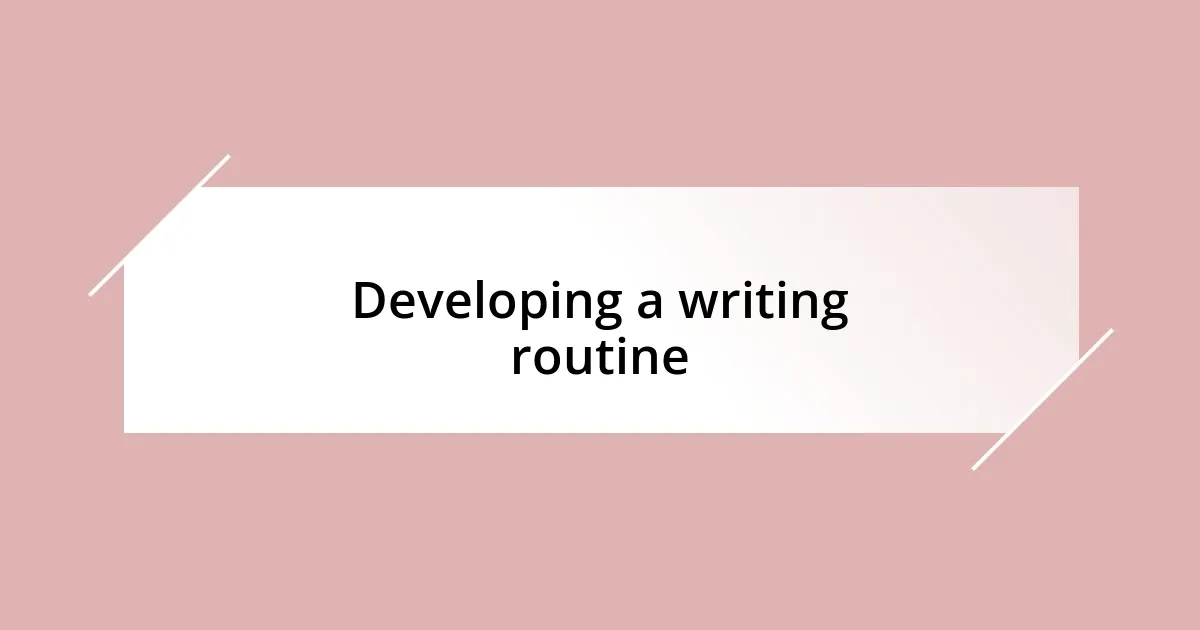
Developing a writing routine
Creating a writing routine truly transformed my approach to writing. At first, I just jotted down thoughts whenever inspiration struck, which made it hard to maintain consistency. One day, I decided to commit to a specific time each day. I remember waking up early—coffee in hand—and sitting at my desk, where the quiet morning hours felt like a sanctuary for my creativity. This simple choice not only strengthened my discipline but also turned writing into a cherished habit.
Here are some tips that helped me develop my writing routine:
- Choose a consistent time: Align writing with when you’re most alert—whether that’s early morning, lunch break, or late at night.
- Set up a dedicated space: Create a specific area where you only write, reinforcing the act as a special ritual.
- Start small: Begin with just 10-15 minutes daily, gradually increasing your time as you grow comfortable.
- Limit distractions: Put your phone away or use apps that block social media, focusing solely on your writing.
- Reflect regularly: At the end of each week, review what you’ve written; this keeps the momentum going and reveals your growth.
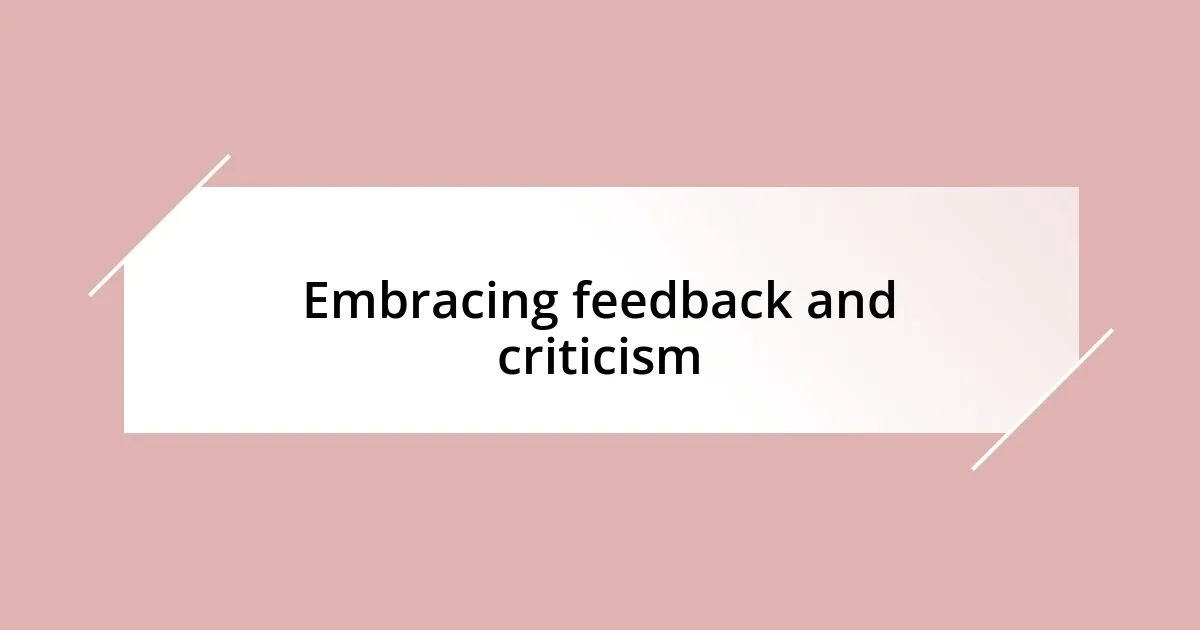
Embracing feedback and criticism
Embracing feedback and criticism has been a pivotal part of my growth as a writer. In the beginning, I often felt defensive when receiving critiques. Instead of seeing them as a chance to improve, I internalized the comments. I remember a peer outlining my writing had been “confusing.” At first, that stung, but as I reflected on it, I realized that clarity is fundamental in communication. It was a moment of awakening that inspired me to listen more actively.
As I sought feedback more openly, I began to welcome all types of responses, from praise to constructive criticism. My perspective shifted; rather than fearing negative remarks, I focused on understanding how my work impacted others. I once shared a piece on a sensitive topic and received feedback that it resonated deeply with some readers while perplexing others. This contrast helped me refine my ability to convey stories, teaching me the importance of clarity and audience awareness. Have you ever noticed how critiques can illuminate aspects we overlook in our writing? It’s a powerful reminder that every comment holds value.
Over time, I developed a systematic approach to feedback that turned potential harshness into a steppingstone. I started by inviting specific questions and focusing on particular elements, like character development or emotional depth. This practice transformed how I engaged with my work. I often think back to a workshop where I learned to ask for detailed feedback. It not only made my writing stronger but also fostered a collaborative spirit among fellow writers, and that positive energy was contagious.
| Type of Feedback | How I Received It |
|---|---|
| Constructive Criticism | Initially felt hurt, later embraced it as a learning opportunity |
| Praise | Boosted my confidence but reminded me to stay humble |
| Specific Suggestions | Helped me focus on particular areas for improvement |

Practicing different writing styles
Practicing different writing styles has been a game-changer in my development. In my early days, I gravitated towards a single genre—fiction—and wrote short stories exclusively. However, on a whim, I decided to dip my toes into poetry. That experience was illuminating; suddenly, I had to be innovative with fewer words, focusing on rhythm and emotion. It felt like a delightful puzzle, transforming how I approached character development in my stories. Have you ever tried something new and found it opened doors to different creative avenues?
As I experimented, I found myself blending styles, which added unique flavors to my writing. For instance, I once wrote a piece that combined narrative prose with poetic elements, weaving imagery into the unfolding story. The response was unexpected; readers were captivated by the fluid movement between these forms. This taught me the beauty of versatility in writing. It not only kept my creativity alive but ensured my work resonated with a broader audience. The joy of blending styles was like dancing; each step influenced the other.
One memorable moment came when I took a workshop focused on writing in different genres. I was nervous about transitioning from fiction to non-fiction, but I pushed through, and that leap helped clarify my voice. The assignment was to write a personal essay, and I poured my heart into a piece about overcoming self-doubt. Sharing that narrative with others was nerve-wracking but also liberating. Each new style I embraced was like adding another brush color to my artistic palette, making my writing richer and more expressive. Why limit ourselves to one style when the world is full of variety and possibility?

Seeking inspiration from diverse sources
Seeking inspiration from diverse sources has always been a cornerstone of my writing journey. I remember one summer, while subletting a quaint apartment in a new city, I discovered a local bookstore. As I perused the shelves, I stumbled upon various genres I had never considered before. This unexpected dive into memoirs and graphic novels opened my eyes to how different forms of storytelling can evoke emotions in unique ways. Have you ever found magic in an unexpected genre?
Traveling has also shaped my understanding of diverse narratives. On a trip to Southeast Asia, I was immersed in rich cultural stories that were vastly different from my own. One morning, a local elder shared tales from his youth, filled with humor and wisdom. It struck me how those stories were not just anecdotes but a form of oral tradition that held the community together. I came home eager to weave that warmth and authenticity into my writing. The cadence of his words still echoes in my mind. Isn’t it fascinating how experiences can enrich our writing voice?
Attending events like poetry slams and storytelling nights became a crucial avenue for me to absorb varied experiences. I recall sitting in a dimly lit café, eager for the performances. The raw vulnerability of the storytellers sparked something within me. Each diverse voice reminded me that there’s no single way to tell a story; every perspective adds depth. I started incorporating more authentic dialogue and diverse characters in my work, eager to reflect the world in all its beauty and complexity. How can we truly enrich our writing without embracing the multitude of voices around us?
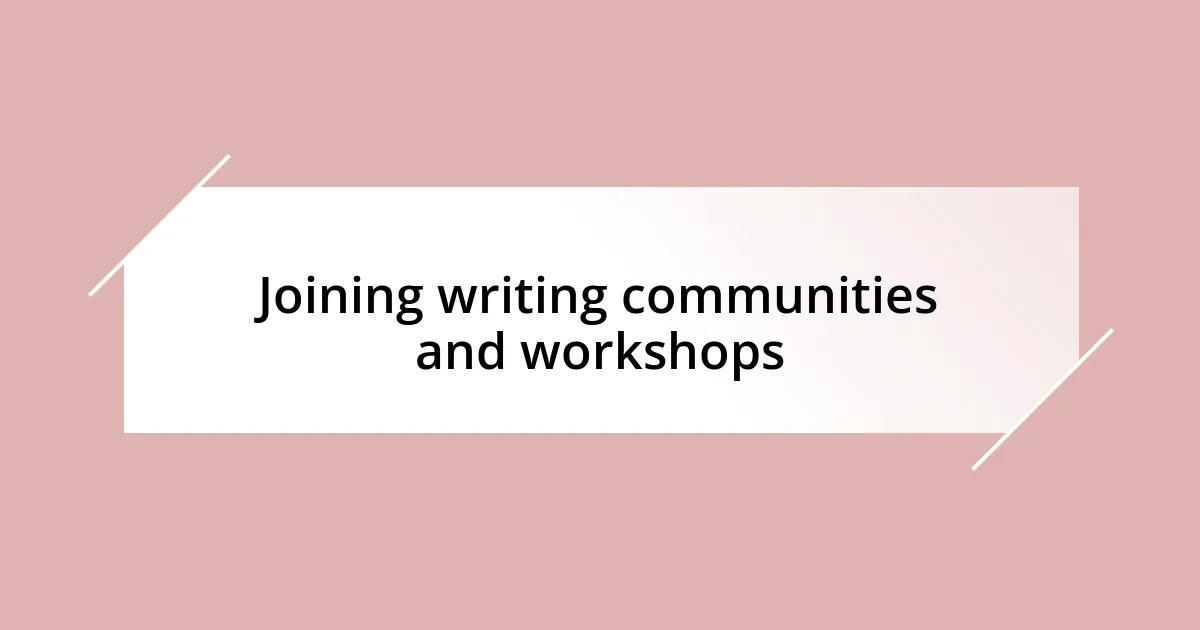
Joining writing communities and workshops
Joining writing communities and workshops has been one of the most rewarding steps in my writing journey. I recall my first experience in a local writers’ group where I was surrounded by individuals of all backgrounds, each bringing unique ideas to the table. Sharing my work felt like peeling back layers of vulnerability; it was daunting at first, but the encouragement I received empowered me to push my creative boundaries. Have you ever felt a sense of belonging that inspired you to write more openly?
In another instance, I attended a weekend-long writing retreat. Picture this: a cozy cabin in the woods, a small group of passionate writers gathered around a fireplace, exchanging stories late into the night. Those moments of laughter and shared struggles fostered friendships that lasted long after the retreat ended. I remember a workshop where we had to write on a prompt and then read our pieces aloud. The nerves were palpable, but hearing others’ heartfelt reactions made me realize how connected we all are through our stories. Isn’t it incredible how community can elevate our writing while providing that much-needed inspiration?
Participating in workshops has sharpened my skills in ways I never imagined. For instance, during one intensive, we delved into the structure of storytelling. I received feedback on a story I thought was polished, only to discover hidden layers I hadn’t explored. The mentor’s insights were enlightening; it felt as though they held a mirror to my work, reflecting possibilities I hadn’t considered. This experience taught me that we often can’t see our own blind spots. How can we grow if we don’t open ourselves to constructive criticism from others with different perspectives?
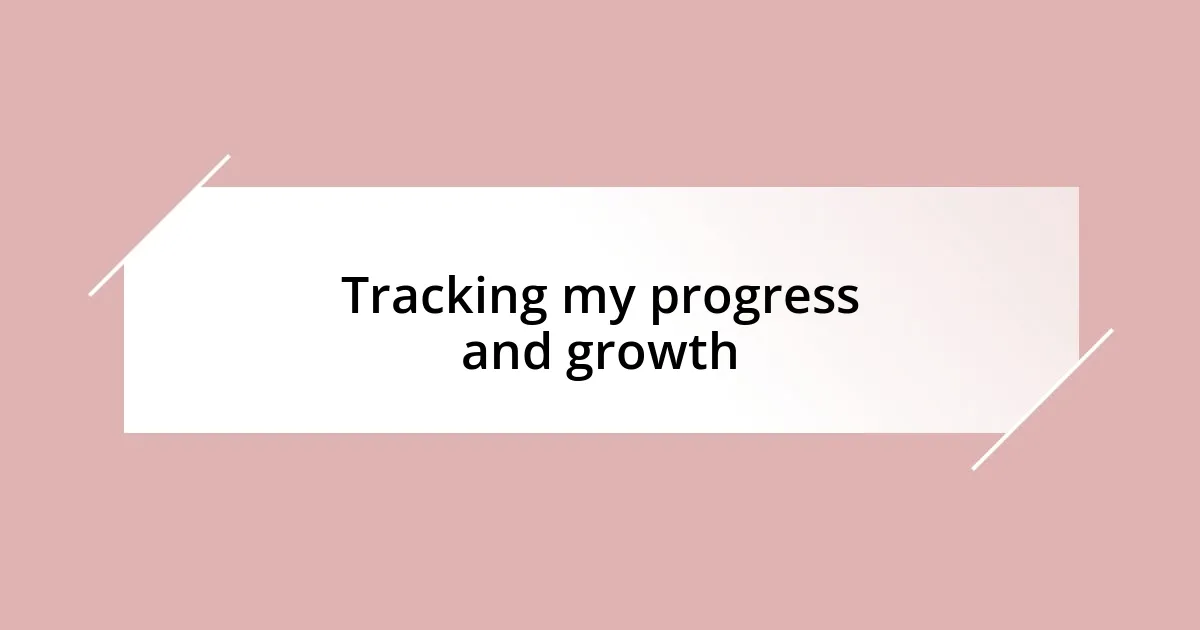
Tracking my progress and growth
Tracking my progress and growth has been a transformative aspect of my writing journey. I remember creating a simple spreadsheet to log my daily word count and the time spent writing. It felt liberating to see numbers reflecting my efforts, and over time, I could visually map out my dedication. Isn’t it empowering to witness tangible growth in something you’re passionate about?
One of the most eye-opening experiences was revisiting older pieces of my writing. Initially, it was awkward to read my early drafts; they felt stilted and raw. But upon reflection, I noticed the seeds of my current voice and style were already there, even if they weren’t fully formed. It made me appreciate the journey I’ve taken and reminded me that every writer must start somewhere. How often do we recognize that our growth is not just about skill but also about finding our unique voice?
Additionally, I found that keeping a writing journal was an invaluable tool for introspection. I would jot down thoughts about my writing process, the challenges I faced, and the breakthroughs I experienced. This habit of tracking my emotional highs and lows gave me clarity. I began to understand patterns in my writing that correlated with my mood and productivity levels. Have you ever considered how your emotions shape your creative output? By recognizing those connections, I’ve learned to navigate my creative blocks more effectively, which ultimately fuels my growth as a writer.












